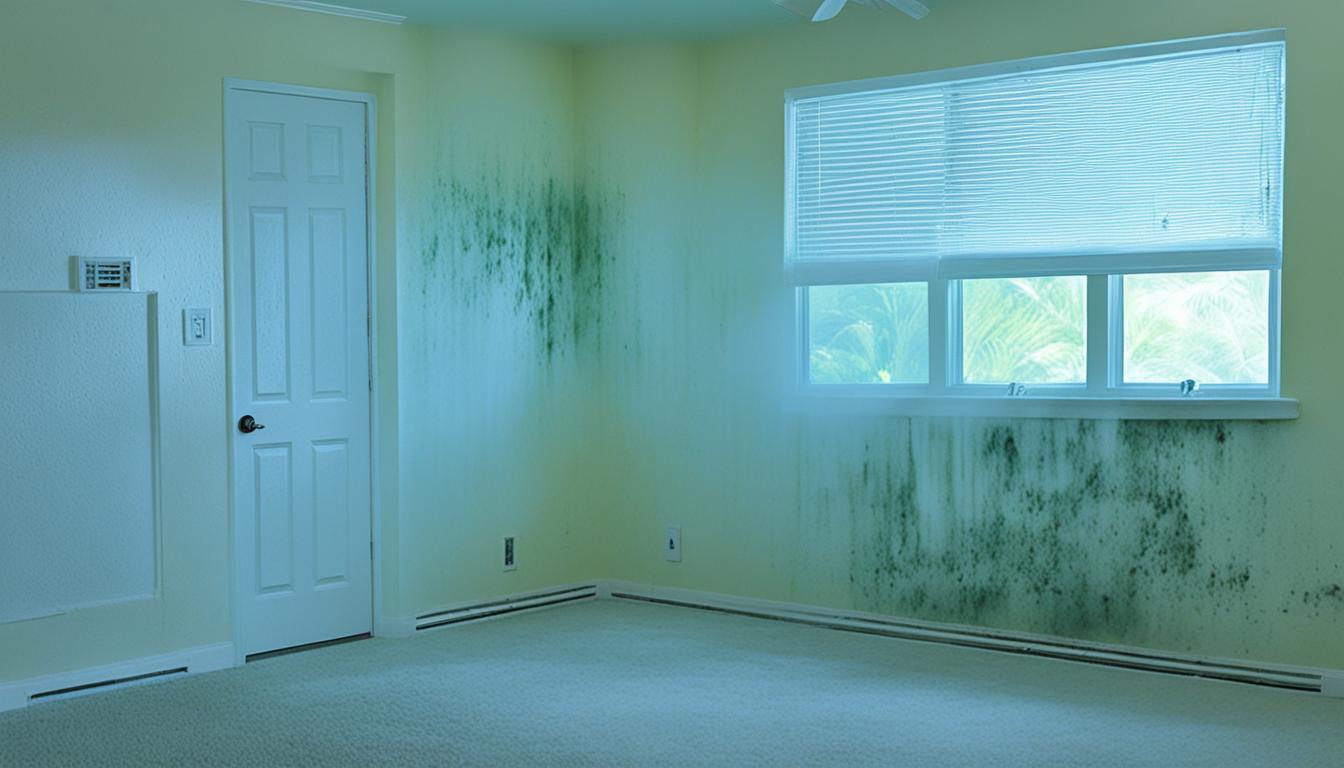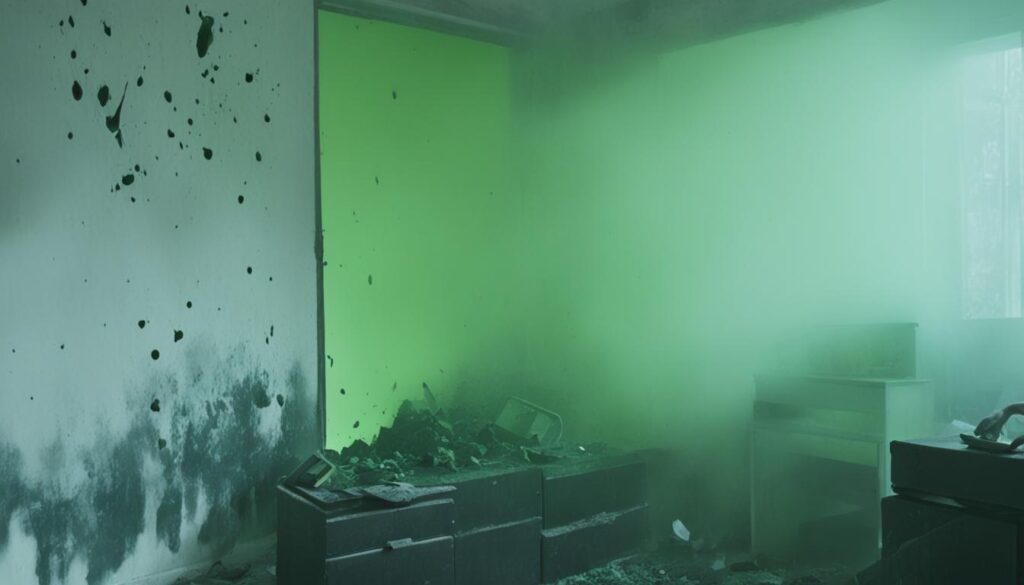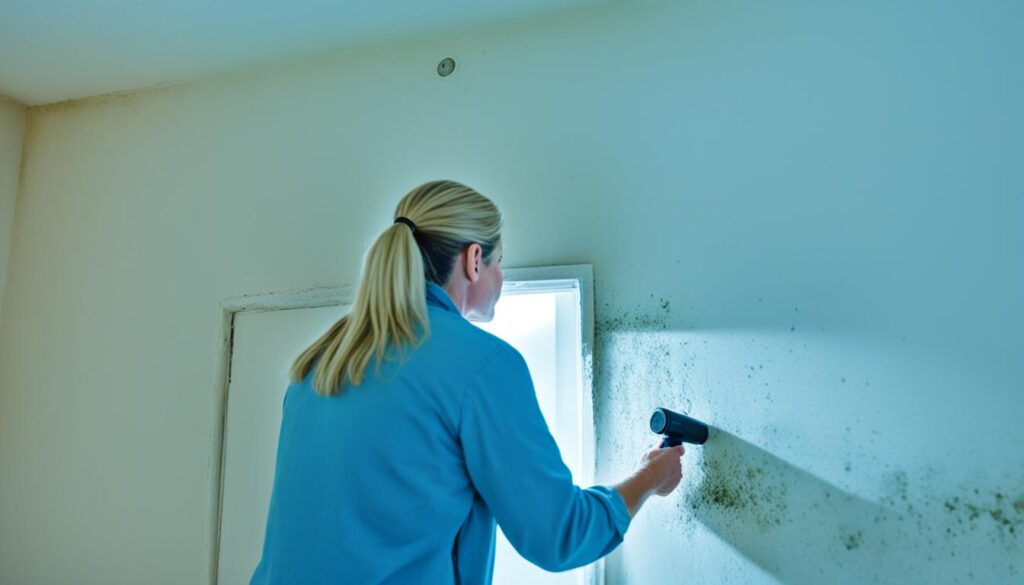
Mold in the House Symptoms Florida: Spot Signs Now
Living in Florida comes with its fair share of challenges, from hurricanes to high humidity levels. Unfortunately, another common issue faced by homeowners in Florida is the presence of mold in their houses. Mold is not only unsightly but can also pose serious health risks if left unchecked. Understanding the symptoms of mold in your Florida home is crucial for protecting your health and maintaining a safe living environment.
Key Takeaways:
- Mold in the house can have detrimental effects on your health.
- Common symptoms of mold include respiratory issues and allergic reactions.
- Detecting mold early is essential for preventing further damage.
- Regular visual inspections and monitoring humidity levels can help detect mold.
- Professional assessments and remediation services are necessary for thorough mold removal.
Common Symptoms of Mold in the House
Mold in the house is not only unsightly but can also pose serious health risks. Understanding the common symptoms related to mold in Florida homes is crucial for early detection and prompt action. By being aware of these signs, you can take appropriate measures to protect your health and well-being.
Respiratory Issues
Mold spores can cause respiratory issues when inhaled. These can range from mild symptoms such as a persistent cough, sneezing, and a runny or stuffy nose to more severe conditions like asthma attacks and difficulty breathing. If you or your family members experience any respiratory problems that worsen when inside the house, mold could be a likely culprit.
Allergic Reactions
Exposure to mold can trigger allergic reactions in sensitive individuals. Common symptoms include itchy and watery eyes, nasal congestion, throat irritation, and skin rashes. Allergies to mold can be particularly problematic for those with pre-existing respiratory conditions or compromised immune systems.
Other Health Risks
Aside from respiratory issues and allergies, mold exposure can lead to other health problems. Some individuals may experience fatigue, headaches, dizziness, and even memory or concentration difficulties. These symptoms can significantly impact your daily life and overall well-being, highlighting the importance of addressing mold concerns promptly.
“The health risks associated with mold in the house should never be underestimated. Prompt action is necessary to identify and eliminate mold to safeguard your health and create a safe living environment.” – Dr. Lisa Morgan, Allergist
To gain a better understanding of the common symptoms of mold in the house, refer to the table below:
| Symptoms | Health Risks |
|---|---|
| Respiratory issues | – Asthma attacks |
| Allergic reactions | – Skin rashes |
| – Throat irritation | |
| – Itchy and watery eyes | |
| Other health risks | – Fatigue |
| – Headaches |

If you experience any of these symptoms and suspect mold may be the cause, it is important to take action. Consult with a mold remediation professional to assess and address the mold issue in your home. Remember, prioritizing your health and well-being is essential when it comes to mold in the house.
Detecting Mold in Your Florida Home
When it comes to mold, early detection is key to preventing further damage and safeguarding your health and property. In this section, we will discuss the various signs you should look for to detect mold in your Florida home. By being vigilant and conducting regular inspections, you can address mold issues promptly and effectively.
Signs of Mold
One of the most common signs of mold is a musty odor. If you notice a persistent earthy or damp smell in your home, it may indicate the presence of mold. Pay attention to areas such as bathrooms, basements, and areas prone to moisture accumulation.
Visual inspections are also crucial in detecting mold. Look out for visible mold growth, which can appear as patches or discoloration on walls, ceilings, and other surfaces. Mold can come in various colors such as black, green, or white, depending on the type of mold and its stage of growth.
Importance of Visual Inspections
Regular visual inspections play a vital role in mold detection. Take the time to inspect areas prone to moisture, such as around pipes, under sinks, and in basements. Check for any signs of water intrusion, such as water stains or discoloration, as these can indicate potential areas of mold growth.
Additionally, pay attention to any visible signs of water damage, such as peeling wallpaper, bubbling paint, or warped surfaces. These can be an indication of an underlying moisture problem that could be fostering mold growth.
Monitoring Humidity Levels
Mold thrives in humid environments. To prevent mold growth, it is essential to monitor indoor humidity levels. Keep your home’s humidity below 60% to inhibit mold growth. If needed, use dehumidifiers in areas that tend to be more humid, such as bathrooms, kitchens, and basements.
Regularly measuring the humidity levels using a hygrometer can help you identify areas where the humidity is consistently high. By addressing these high-humidity areas and implementing moisture control measures, you can effectively reduce the risk of mold growth.

Taking Action
If you suspect mold in your Florida home, it is crucial to take immediate action to mitigate the issue. In the next section, we will discuss mold prevention measures and the importance of professional assessments for comprehensive mold remediation.
Conclusion
Addressing mold in Florida homes promptly is crucial for the health and well-being of your family. By prioritizing mold prevention measures, you can minimize the risk of mold growth and its associated health hazards. Regular inspections, prompt repairs of any leaks or water damage, and maintaining indoor humidity levels below 50% are effective ways to prevent mold.
However, if you suspect or detect the presence of mold in your home, it is important to seek professional assessment and remediation services. Professional mold assessors have the knowledge, expertise, and specialized equipment to accurately identify the extent of mold growth and determine the appropriate measures for remediation.
To ensure a safe and thorough mold remediation process, contact Fix Mold Miami at 305-465-6653. Our team of experienced professionals will conduct a comprehensive assessment, provide expert advice, and deliver effective mold remediation solutions tailored to your specific needs. Don’t let mold jeopardize your health and the integrity of your home – take action today.




